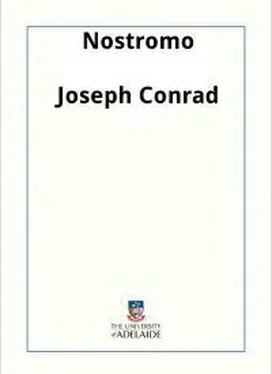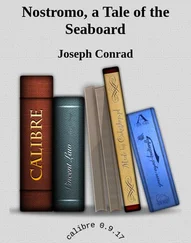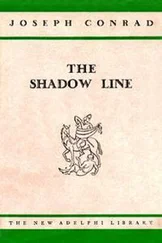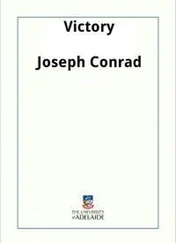Джозеф Конрад - Nostromo - A Tale of the Seaboard
Здесь есть возможность читать онлайн «Джозеф Конрад - Nostromo - A Tale of the Seaboard» весь текст электронной книги совершенно бесплатно (целиком полную версию без сокращений). В некоторых случаях можно слушать аудио, скачать через торрент в формате fb2 и присутствует краткое содержание. Год выпуска: 2006, Жанр: Классическая проза, на английском языке. Описание произведения, (предисловие) а так же отзывы посетителей доступны на портале библиотеки ЛибКат.
- Название:Nostromo: A Tale of the Seaboard
- Автор:
- Жанр:
- Год:2006
- ISBN:нет данных
- Рейтинг книги:4 / 5. Голосов: 1
-
Избранное:Добавить в избранное
- Отзывы:
-
Ваша оценка:
- 80
- 1
- 2
- 3
- 4
- 5
Nostromo: A Tale of the Seaboard: краткое содержание, описание и аннотация
Предлагаем к чтению аннотацию, описание, краткое содержание или предисловие (зависит от того, что написал сам автор книги «Nostromo: A Tale of the Seaboard»). Если вы не нашли необходимую информацию о книге — напишите в комментариях, мы постараемся отыскать её.
Nostromo: A Tale of the Seaboard — читать онлайн бесплатно полную книгу (весь текст) целиком
Ниже представлен текст книги, разбитый по страницам. Система сохранения места последней прочитанной страницы, позволяет с удобством читать онлайн бесплатно книгу «Nostromo: A Tale of the Seaboard», без необходимости каждый раз заново искать на чём Вы остановились. Поставьте закладку, и сможете в любой момент перейти на страницу, на которой закончили чтение.
Интервал:
Закладка:
“Ha!” he murmured, with his head on his knees, under the livid clouded dawn breaking over the liberated Sulaco and upon the gulf as gray as ashes. “It is to her that he will fly. To her that he will fly!”
And four ingots! Did he take them in revenge, to cast a spell, like the angry woman who had prophesied remorse and failure, and yet had laid upon him the task of saving the children? Well, he had saved the children. He had defeated the spell of poverty and starvation. He had done it all alone—or perhaps helped by the devil. Who cared? He had done it, betrayed as he was, and saving by the same stroke the San Tome mine, which appeared to him hateful and immense, lording it by its vast wealth over the valour, the toil, the fidelity of the poor, over war and peace, over the labours of the town, the sea, and the Campo.
The sun lit up the sky behind the peaks of the Cordillera. The Capataz looked down for a time upon the fall of loose earth, stones, and smashed bushes, concealing the hiding-place of the silver.
“I must grow rich very slowly,” he meditated, aloud.
CHAPTER ELEVEN
Sulaco outstripped Nostromo’s prudence, growing rich swiftly on the hidden treasures of the earth, hovered over by the anxious spirits of good and evil, torn out by the labouring hands of the people. It was like a second youth, like a new life, full of promise, of unrest, of toil, scattering lavishly its wealth to the four corners of an excited world. Material changes swept along in the train of material interests. And other changes more subtle, outwardly unmarked, affected the minds and hearts of the workers. Captain Mitchell had gone home to live on his savings invested in the San Tome mine; and Dr. Monygham had grown older, with his head steel-grey and the unchanged expression of his face, living on the inexhaustible treasure of his devotion drawn upon in the secret of his heart like a store of unlawful wealth.
The Inspector-General of State Hospitals (whose maintenance is a charge upon the Gould Concession), Official Adviser on Sanitation to the Municipality, Chief Medical Officer of the San Tome Consolidated Mines (whose territory, containing gold, silver, copper, lead, cobalt, extends for miles along the foot-hills of the Cordillera), had felt poverty-stricken, miserable, and starved during the prolonged, second visit the Goulds paid to Europe and the United States of America. Intimate of the casa, proved friend, a bachelor without ties and without establishment (except of the professional sort), he had been asked to take up his quarters in the Gould house. In the eleven months of their absence the familiar rooms, recalling at every glance the woman to whom he had given all his loyalty, had grown intolerable. As the day approached for the arrival of the mail boat Hermes (the latest addition to the O. S. N. Co.‘s splendid fleet), the doctor hobbled about more vivaciously, snapped more sardonically at simple and gentle out of sheer nervousness.
He packed up his modest trunk with speed, with fury, with enthusiasm, and saw it carried out past the old porter at the gate of the Casa Gould with delight, with intoxication; then, as the hour approached, sitting alone in the great landau behind the white mules, a little sideways, his drawn-in face positively venomous with the effort of self-control, and holding a pair of new gloves in his left hand, he drove to the harbour.
His heart dilated within him so, when he saw the Goulds on the deck of the Hermes, that his greetings were reduced to a casual mutter. Driving back to town, all three were silent. And in the patio the doctor, in a more natural manner, said—
“I’ll leave you now to yourselves. I’ll call to-morrow if I may?”
“Come to lunch, dear Dr. Monygham, and come early,” said Mrs. Gould, in her travelling dress and her veil down, turning to look at him at the foot of the stairs; while at the top of the flight the Madonna, in blue robes and the Child on her arm, seemed to welcome her with an aspect of pitying tenderness.
“Don’t expect to find me at home,” Charles Gould warned him. “I’ll be off early to the mine.”
After lunch, Dona Emilia and the senor doctor came slowly through the inner gateway of the patio. The large gardens of the Casa Gould, surrounded by high walls, and the red-tile slopes of neighbouring roofs, lay open before them, with masses of shade under the trees and level surfaces of sunlight upon the lawns. A triple row of old orange trees surrounded the whole. Barefooted, brown gardeners, in snowy white shirts and wide calzoneras, dotted the grounds, squatting over flowerbeds, passing between the trees, dragging slender India-rubber tubes across the gravel of the paths; and the fine jets of water crossed each other in graceful curves, sparkling in the sunshine with a slight pattering noise upon the bushes, and an effect of showered diamonds upon the grass.
Dona Emilia, holding up the train of a clear dress, walked by the side of Dr. Monygham, in a longish black coat and severe black bow on an immaculate shirtfront. Under a shady clump of trees, where stood scattered little tables and wicker easy-chairs, Mrs. Gould sat down in a low and ample seat.
“Don’t go yet,” she said to Dr. Monygham, who was unable to tear himself away from the spot. His chin nestling within the points of his collar, he devoured her stealthily with his eyes, which, luckily, were round and hard like clouded marbles, and incapable of disclosing his sentiments. His pitying emotion at the marks of time upon the face of that woman, the air of frailty and weary fatigue that had settled upon the eyes and temples of the “Never-tired Senora” (as Don Pepe years ago used to call her with admiration), touched him almost to tears. “Don’t go yet. To-day is all my own,” Mrs. Gould urged, gently. “We are not back yet officially. No one will come. It’s only to-morrow that the windows of the Casa Gould are to be lit up for a reception.”
The doctor dropped into a chair.
“Giving a tertulia?” he said, with a detached air.
“A simple greeting for all the kind friends who care to come.”
“And only to-morrow?”
“Yes. Charles would be tired out after a day at the mine, and so I——It would be good to have him to myself for one evening on our return to this house I love. It has seen all my life.”
“Ah, yes!” snarled the doctor, suddenly. “Women count time from the marriage feast. Didn’t you live a little before?”
“Yes; but what is there to remember? There were no cares.”
Mrs. Gould sighed. And as two friends, after a long separation, will revert to the most agitated period of their lives, they began to talk of the Sulaco Revolution. It seemed strange to Mrs. Gould that people who had taken part in it seemed to forget its memory and its lesson.
“And yet,” struck in the doctor, “we who played our part in it had our reward. Don Pepe, though superannuated, still can sit a horse. Barrios is drinking himself to death in jovial company away somewhere on his fundacion beyond the Bolson de Tonoro. And the heroic Father Roman—I imagine the old padre blowing up systematically the San Tome mine, uttering a pious exclamation at every bang, and taking handfuls of snuff between the explosions—the heroic Padre Roman says that he is not afraid of the harm Holroyd’s missionaries can do to his flock, as long as he is alive.”
Mrs. Gould shuddered a little at the allusion to the destruction that had come so near to the San Tome mine.
“Ah, but you, dear friend?”
“I did the work I was fit for.”
“You faced the most cruel dangers of all. Something more than death.”
“No, Mrs. Gould! Only death—by hanging. And I am rewarded beyond my deserts.”
Noticing Mrs. Gould’s gaze fixed upon him, he dropped his eyes.
Читать дальшеИнтервал:
Закладка:
Похожие книги на «Nostromo: A Tale of the Seaboard»
Представляем Вашему вниманию похожие книги на «Nostromo: A Tale of the Seaboard» списком для выбора. Мы отобрали схожую по названию и смыслу литературу в надежде предоставить читателям больше вариантов отыскать новые, интересные, ещё непрочитанные произведения.
Обсуждение, отзывы о книге «Nostromo: A Tale of the Seaboard» и просто собственные мнения читателей. Оставьте ваши комментарии, напишите, что Вы думаете о произведении, его смысле или главных героях. Укажите что конкретно понравилось, а что нет, и почему Вы так считаете.












